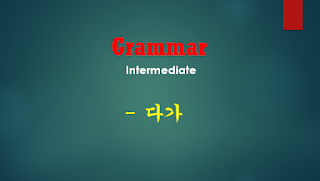- 다가
→ '-다가'(refer to Intermediate 1, Lesson 4) standing for 'stopping an action or changing to another action' also indicates a cause or a reason.' It means that among the actions taken in a preceding part, the action can lead to an unexpected following result. When the action of the preceding part is completed and the unexpected result of the following part is shown, -았/었다가' is used.
Example:
1. 날마다 이렇게 놀다가 시험에 떨어지면 어떻게 하려고 그래요?
If you play like this every day and fail an exam, what would you do?
2. 백화점에 갔다가 우연히 중학교 동창생을 만났어요.
I went to a department store and came across a school fellow from my middle school.
3. 사과하지 않았다가 나중에 큰 싸움이 일어났어요.
He didn't apologize and it caused a big fight afterward.
4. 과속을 하다가 경찰에게 잡혔어요.
I was caught by the police while speeding.
5. 할까 말까 망설이다가 좋은 기회를 놓쳤어요.
I hesitated whether to do it or not, and missed a good opportunity.


![[Video Lesson] V- (으)ㄹ 바에는[바에야] (차라리)](https://blogger.googleusercontent.com/img/b/R29vZ2xl/AVvXsEiwkGyP7qlWFSS_w4M6KJl9Zus3mNEUFyWqirgTm_YpQhlgXkzUHGh3En5C_IUG3c2wZEGw7SKiWf5SksJ2slpjR5x12uCpM2ML_u7BkYPU4gd8MwjXpsOyF8Kiojo2qmX6ujX5n-T6CG9462zac6JTkHfHGwYh0hJNQTVvXpCAdEtl2ItTTSQn8mL9WQ/w680/%EB%B0%94%EC%97%90%EB%8A%94%5B%EB%B0%94%EC%97%90%EC%95%BC%5D%20(%EC%B0%A8%EB%9D%BC%EB%A6%AC)video.PNG)
![EPS-TOPIK Test [Listening-2]](https://blogger.googleusercontent.com/img/b/R29vZ2xl/AVvXsEi4eCnsMh8pDQqBXrE9T_u886vg4dQs0yRYeQ6QgfsqdS0hkZ4318tzwJuoEuaR_QBSbIW-Fs_EGtGEQXjyhaUm7sgUEEOmehdyrbUdXbHCkN9m2NdxO4zY4jNwaj9uJcwdxVMGxLflcuEDrPBYxps4M-ARAAbzsFRSGdm3FKVZjaF_wrCMOdGkBM649Q/w680/eps%20topik%20test.PNG)
![커녕 [Intermediate Grammar]](https://blogger.googleusercontent.com/img/b/R29vZ2xl/AVvXsEhKckQtTreCTRfHaKeCFIS3r410JgLpD93HfuPh-YKUiIxtTIAMhb8__BtxbSsv7_6pw15v-K9MBrz_KpVmbdLKcv8AxQG318qDDEzrap7KhfEA10WYUjXCzZas7rCrmmGp0ZbMEWvAuJavEZHYRGUcw_AuHPgJ1ZscGOqhEYQhS2Rg38Mc6qyj9kCZhg/w680/%EC%BB%A4%EB%85%95.PNG)
